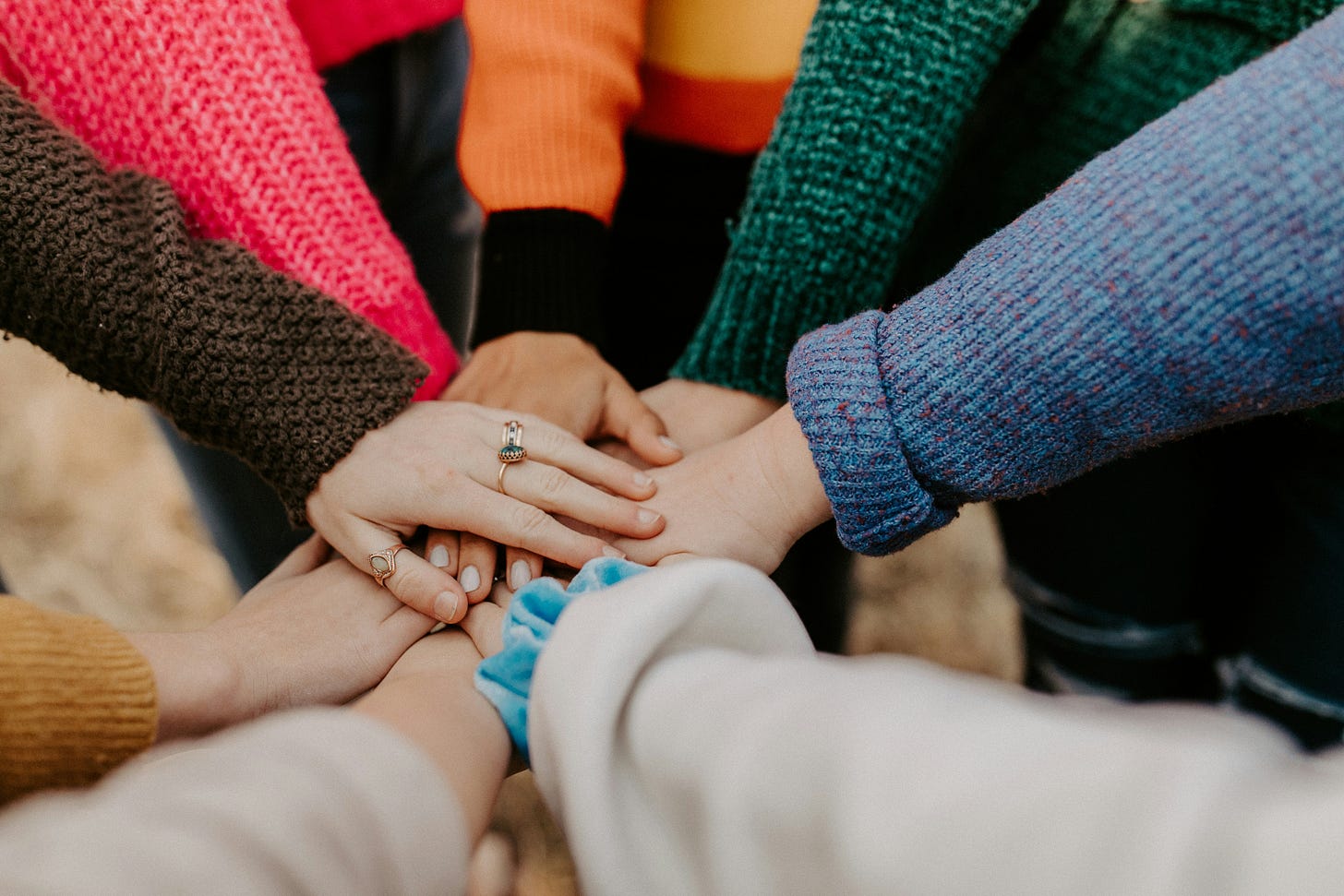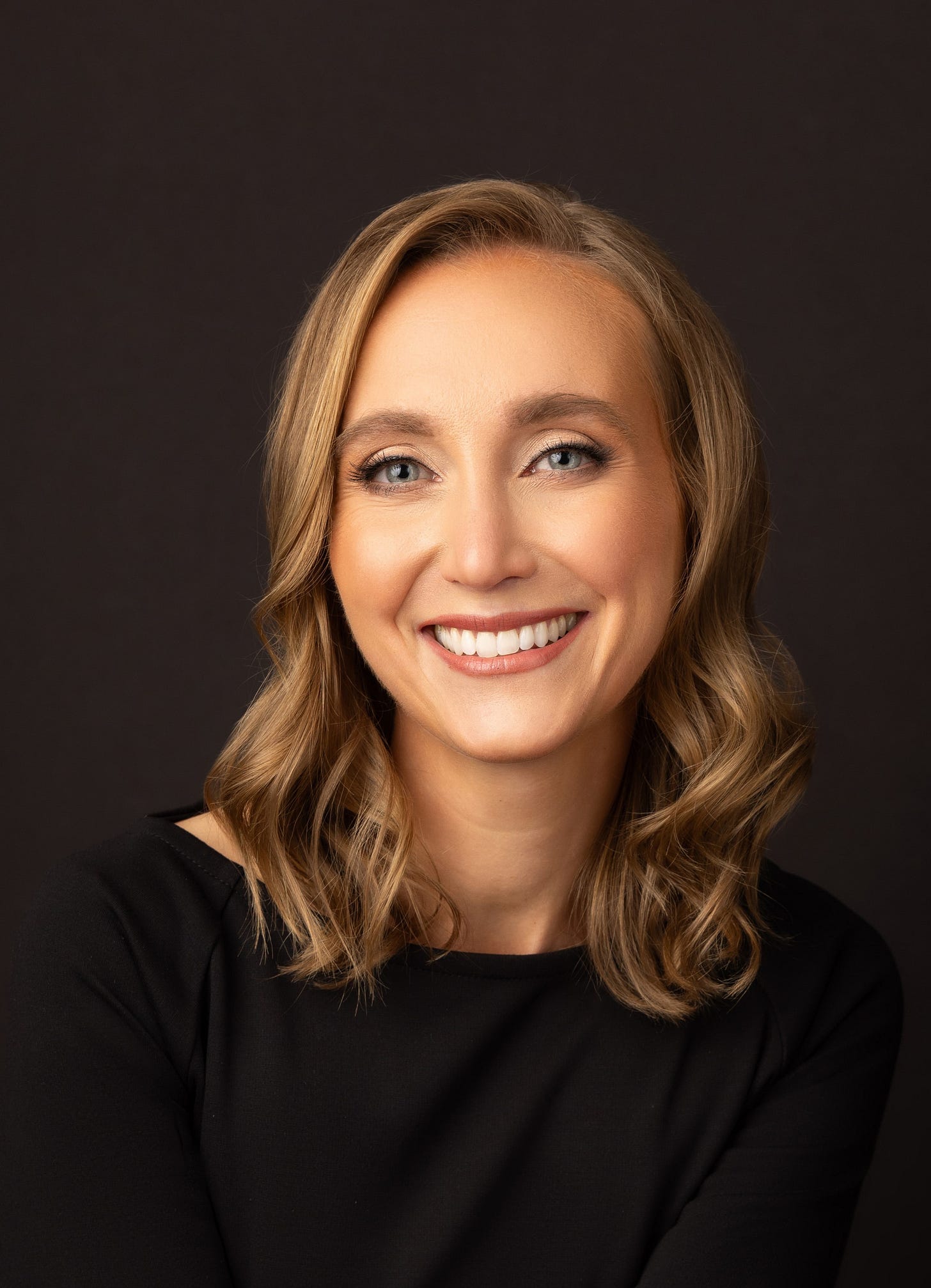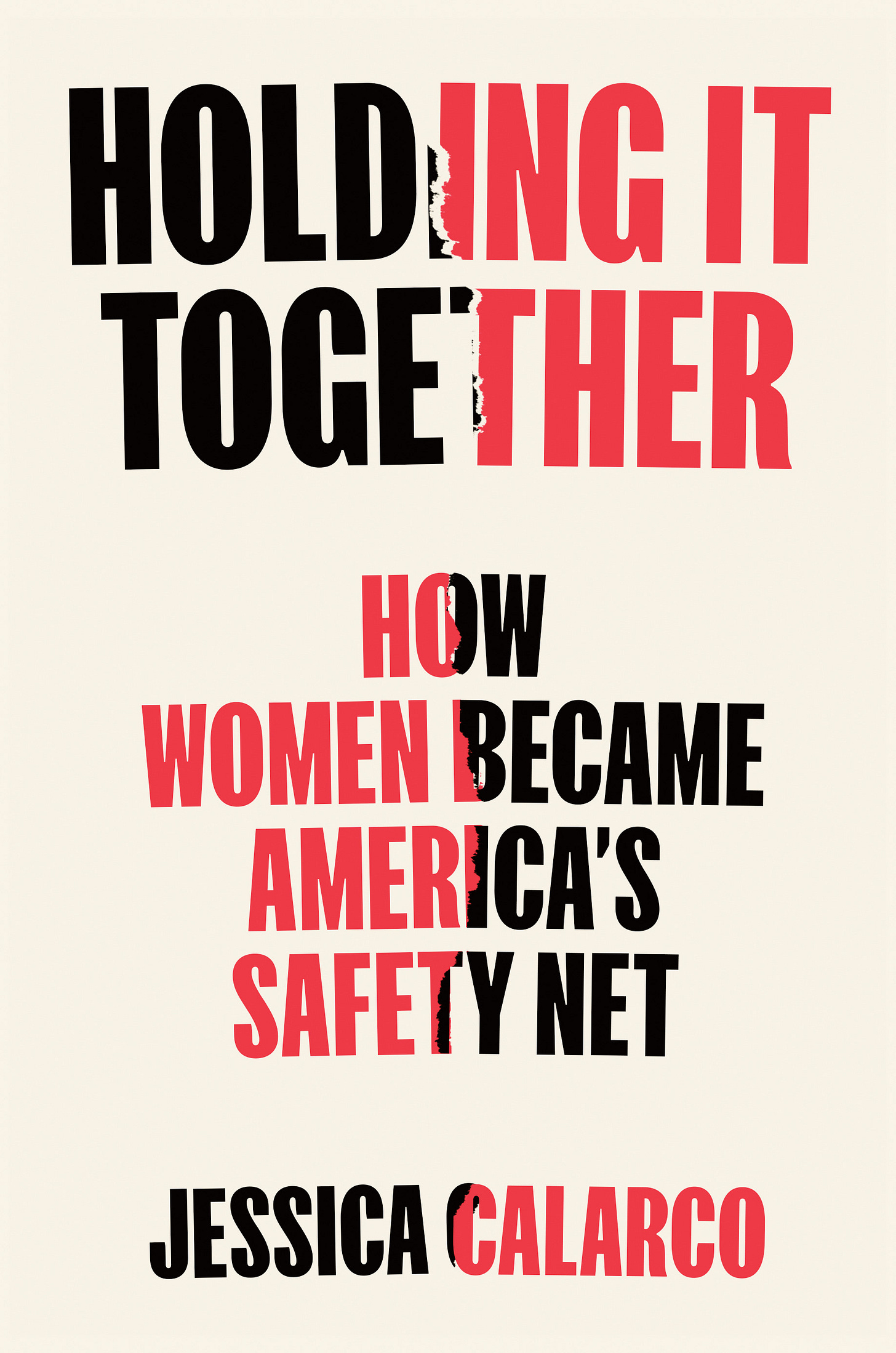"Women prove they can hold it all together. We thank them by giving them more to hold."
A conversation with sociologist Jessica Calarco

Back in November 2020, in the thick of the pandemic, the sociologist Jessica Calarco did an interview in which she said the quiet part out loud:
“Other countries have social safety nets. The U.S. has women.”
It was a time when things felt so precarious and uncertain.
It was a time when we could have done so much to support families – and we chose not to.
“In our society, women end up being the default caregivers. The assumption that women are the natural caregivers for children spills out into — well — they must then be the natural caregivers for everyone,” she told me.
Calarco is a professor at the University of Wisconsin. She sees sociology as a force for “ungaslighting.”
“It’s about getting people to see — it's not you, it's the system.”
Now, her new book, Holding it Together: How Women Became America’s Safety Net" digs deep in how our mess of a system came about — how we came to accept it — even with so many of us still feeling so precarious, in everything from our health care system, to our access to childcare, to our ability to take care of ourselves and people we love into their old age.
And the good news is that she has some solutions, which we can all jump into right now.
I spoke to her recently about the book, the myths that hold our system together, and what we can do to change it. I’ve edited our conversation for length and clarity.
This seems so basic and maybe this is because I’ve lived in the U.S. my whole life…but…what is a social safety net? And what does it look like when it works?
When I'm talking about a social safety net, I'm talking about a set of social programs that are designed to help meet people's basic needs for human life – especially those things that are hard meet to in an individualized way, like health care.
We have to rely on other people for health care, or we have to rely on other people for childcare.
It's a way of filling in gaps, making sure that people don't fall into poverty, don't fall into homelessness, and ideally, help people to have more of a sense of stability.
You can think about it like tightrope walking.
It's there to protect you if you fall, and also to give you a sense of security and stability, so that you can take risks. When we have that protection in place, it's much easier to imagine a future where you're striving for things that are better, as opposed to just trying to stay as tightly as possible to wherever you are right now.
All of us have care responsibilities, even if those roles aren't formal or paid. Putting supports in place so that we all have the time and the space and the mental energy to do that care.
Things like paid family leave, paid sick leave, paid vacation time, stipends for families with dependents, preventing employers from penalizing workers for taking time off.
So all of that is exactly the opposite of what you call our “DIY” society. The DIY society says, “You shouldn't need that net, you should be able to hold yourself if you fall. Basically, it's on you.”
I really am talking about neoliberalism, which is the idea that people are supposed to support themselves, without assistance or interference from the state.
Right in the wake of the New Deal, business leaders in the U.S., like the National Association of Manufacturers were seeing these rising taxes on corporations and wealthy people as a threat to their power in society.
So they were looking for ways to persuade Americans that this kind of New Deal big government policy was maybe not the way to go.
They essentially started propaganda campaigns, with things like the American Family Robinson, the radio program, and later, the General Electric Theater, which was hosted by Ronald Reagan.
Ronald Reagan goes from this union leader – he was the leader in the first SAG AFTRA strike – and goes on to become Reagan, the president who is railing on unions. It's like, where did this happen? It happened through this propaganda campaign.
He was paid to be the host of one of the most popular television programs in the U.S. at the time, which was explicitly designed to persuade people that we don't need government or employers to protect us, and that we're actually better off without a social safety net, because then we're more likely to make the kinds of “good choices” that will keep ourselves safe from risk.
So it's this circular logic: If we don't have a safety net, people will make better choices, and then we won't need the net anyway, because they'll make choices to keep themselves safe.
I want to ask you about the “the meritocracy myth,” and talk about April, a woman that you interviewed. She is someone who compares her “good” financial choices to other people’s “bad” choices. And she describes other people’s choices as a kind of moral failure, and her choices as evidence that she deserves everything she has.
But you point out that April benefits from things like public education, for example. She benefits from Medicaid and subsidies for homeowners.
So there are all these systems that help people. But folks who believe they’ve achieved everything they have through their own hard work just kind of…don't see them.
I'm wondering, Why doesn't she see them?
There's some really interesting social psychological research that shows that – if you encourage people to focus on the people who are just below them on the ladder – to look at those people who you're just a little bit better off than, it leads to feelings of superiority.
You could imagine a world where people who fell just above the cutoff line for Medicaid, said, “Hey, let's expand these programs. I would be better off if I had access to those programs.”
Instead, we’ve wrapped these programs in stigma and shame so that people can feel morally superior if they can claim: “I earn too much for that program, so I am more morally deserving for not having to be someone who depends on the government.”
So it’s this idea that not needing that kind of support makes you morally superior, because if you need it, it means that you did something wrong.
We keep these programs so small and limited, and we wrap them in so many stereotypes and stigmas. So it makes it very easy to keep people from supporting the extension of the social safety net.
Often it's those people who fall just above the line that are most opposed to making welfare benefits more generous, or to making these programs stronger, because it's what helps them to maintain their sense of identity, their sense of moral worth. It’s by comparing themselves to others who are just a little bit below them and saying, “I may not be wealthy, I may not be rich, but at least I'm better than you.“
That’s the way that our society encourages people to think about inequality.
Hello new readers! Get essays like this every week by subscribing using the button below.
You write in the book that the problem is that when women prove they can hold it together, we thank them by giving them more to hold. But my question is: Why is it hard to say no to more caregiving and service?
I think the heart of why it’s hard to say no stems from the fact that we know that the systems that we are operating in are broken. If we don't do this, someone is going to not get the support and care that they need.
It's very hard for people who are attentive to those gaps in the system, to say, “Oh no, I'm just going to not care about anybody else.”
And I think that's especially true for people who, because of their own precarity within that system, understand that you're probably going to need somebody else's help someday.
Saying no both feels morally fraught in the sense of, “Who is going to be let down by me saying no?” And also personally fraught, in the sense of, “What am I putting at risk by not saying yes right now?”
The systems that are failing the poorest among us are also failing the privileged among us in similar types of ways, even if not to the same extent.

Your book starts with a scene where you're typing your manuscript for this project, and the Dobbs decision comes down. How do you make the connection between the issues of lack of a safety net, and the ramped up attacks on reproductive rights?
We're seeing women questioning that maybe marriage is not the right option, maybe childbearing is not the right option. We've put so much pressure on women to be the ones who have to hold their families together — and their communities and do all of this labor.
Motherhood is not the only root of exploitation, but in the absence of paid family leave and in the absence of affordable childcare, motherhood can very easily become a trap.
Once women are in that situation and have a child that they're responsible for, and don't have access to childcare or paid leave, they can be forced to either take whatever paid job is available to support them, or to become dependent on men's labor.
So we've seen women pushing back against that and saying, like, “Maybe this isn't the right choice. Maybe motherhood is not the way that I want to go.”
And you say in the book that, if we think of people like cogs in a machine, we actually need babies who are born into precarity, because those are the babies who are more likely to grow up to be the people who fill jobs that no one else wants to take.
I think that's what they're trying to protect with attacks on reproductive freedom. They are trying to make sure that women stay in a position where they can be easily manipulated for the benefit of the capitalist economy, and for the benefit of the patriarchy, and to make sure we have enough kids to become the kinds of low-income adults who don't have very much choice about which jobs to take.
Would you help us out by throwing us a like and a comment? That helps us move up in the algorithm and find new readers. You can also send MR to someone who would like it
I work with a handful of people who grew up outside the U.S. and they just shake their heads and ask, “Why aren't people rioting in the streets over how terrible the healthcare system is?” How can we get into the streets about these things? It’s not like we don’t have examples of how these programs could work.
If we want to change things, we have to get people to reject these myths. The myth of meritocracy, this supermom idea that women have to do everything because they're the only ones who can protect kids. We have to get people to reject those ideas if we're ever going to persuade them to vote for their own interests.
Once you put new policies in place, people's attitudes follow suit. Once you get family leave for everyone, everyone gets on board, gender ideologies change, and people become more egalitarian.
The problem right now is the political will. We have big businesses and billionaires and people who are pulling the strings behind the scenes in ways that prevent that from happening, at least on the political level.
We need to help people to reject these ideas that are keeping them deluded and divided.
Deluded into believing that we don't need a social safety net, and divided in ways that keep us from coming together to fight for this better net, for things that that could actually protect us.
I see hope in that there are spaces in our society where people come together, that could be harnessed for education, and for political movement, and for collective action.
Like, for example, the amount of time that moms who have young kids spend on Facebook mom’s groups. A lot of it is talking about which diaper cream is the best or which preschool should I choose for my kid. But that can be a place where we harness that energy.
I hope this book will maybe start some conversation. Maybe one of us wants to run for local office, and the rest of us will support that for that person in doing so.
We can start a groundswell from those spaces where people are already coming together and helping them to see across difference, helping them to recognize that we are stronger together and that we have these shared interests.
All of us would be better off with the kinds of social safety net programs that many countries take for granted.
And we could certainly have them if we wanted to.
Jessica Calarco’s new book is Holding it Together: How Women Became America’s Safety Net.
Paid subscriptions and gift subscriptions keep this work going, starting at just $5 a month using the link below, and give you unlimited to access to MR posts, archives, and subscriber chats. Thank you for reading, and thank you for being here!
MATRIARCHY REPORT is written by Lane Anderson and Allison Lichter.
Lane Anderson is a writer, journalist, and Clinical Associate Professor at NYU who has won fellowships and many SPJ awards for her writing on inequality and family social issues. She has an MFA from Columbia University. She was raised in Utah and lives in New York City with her partner and young daughter.
Allison Lichter is an associate dean at the Newmark Graduate School of Journalism at the City University of New York. She has been a writer, producer and editor for radio and print, covering the arts, politics, and the workplace. She was born and raised in Queens, and lives in Brooklyn with her partner and daughter.





“The assumption that women are the natural caregivers for children spills out into — well — they must then be the natural caregivers for everyone,”
This really sums it up! And if women were to drop that labor now, the suffering would be unimaginable. What a trap that imperils everyone 🙃
“I work with a handful of people who grew up outside the U.S. and they just shake their heads and ask, “Why aren't people rioting in the streets over how terrible the healthcare system is?””
I live outside the US and can confirm the US lack of social safety net / health care system seems EXTREMELY GRIM